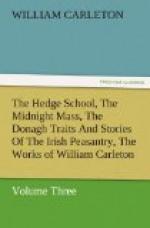Their grief was exclamatory and full of horror: consisting of prolonged shrieks on the part of the women, and frantic howlings on that of the men. The only words they uttered were his name, with epithets and ejaculations. Oh a Vichaul dheelish—a Vichaul dheelish—a bouchal bane machree—wuil thu marra—wuil thu marra? “Oh, Michael, the beloved—Michael, the beloved—fair boy of our heart—are you dead?—are you dead?” From M’Kenna’s the crowd, at the head of which was Darby More, proceeded towards the mountains, many of them bearing torches, such as had been used on their way to the Midnight Mass. The moon had disappeared, the darkness was deepening, and the sky was overhung with black heavy clouds, that gave a stormy character to scenery in itself re wild and gloomy.
Young M’Kenna and the pilgrim led them to the dreary waste in which the corpse lay. It was certainly an awful spectacle to behold these unhappy people toiling up the mountain solitude at such an hour, their convulsed faces thrown into striking relief by the light of the torches, and their cries rising in wild irregular cadences upon the blast which swept over them with a dismal howl, in perfect character with their affliction, and the circumstances which produced it.
On arriving within view of the corpse, there was a slight pause; for, notwithstanding the dreadful paroxysms of their grief, there was something still more startling and terrible in contemplating the body thus stretched out in the stillness of death, on the lonely mountain. The impression it produced was peculiarly solemn: the grief was hushed for a moment, but only for a moment; it rose again wilder than before, and in a few minutes the friends of Reillaghan were about to throw themselves upon the body, under the strong impulse of sorrow and affection.
The mendicant, however, stepped forward “Hould back,” said he; “it’s hard to ax yez to do it, but still you must. Let the neighbors about us here examine the body, in ordher to see whether it mightn’t be possible that the dacent boy came by his death from somebody else’s hand than his own. Hould forrid the lights,” said he, “till we see how he’s lyin’, an’ how the gun’s lyin’.”
“Darby,” said young Frank, “I can’t but be oblaged to you for that. You’re the last man livin’ ought to say what you said, afther you seein’ us both forget an’ forgive this day. I call upon you now to say whether you didn’t see him an’ me shakin’ hands, and buryin’ all bad feelin’ between us?”
“I’ll spake to you jist now,” replied the mendicant. “See here, neighbors, obsarve this; the boy was shot in the breast, an’ here’s not a snow wreath, but a weeshy dhrift that a child ’ud step acrass widout an accident. I tell you all, that I suspect foul play in this.”
“Hell’s fire,” exclaimed the brother of the deceased, “what’s that you say? What! Can it be—can it—can it—that you murdhered him, you villain, that’s known to be nothin’ but a villain? But I’ll do for you!” He snatched at the gun as he spoke, and would probably have taken ample and fearful vengeance upon Frank, had not the mendicant and others prevented him.




